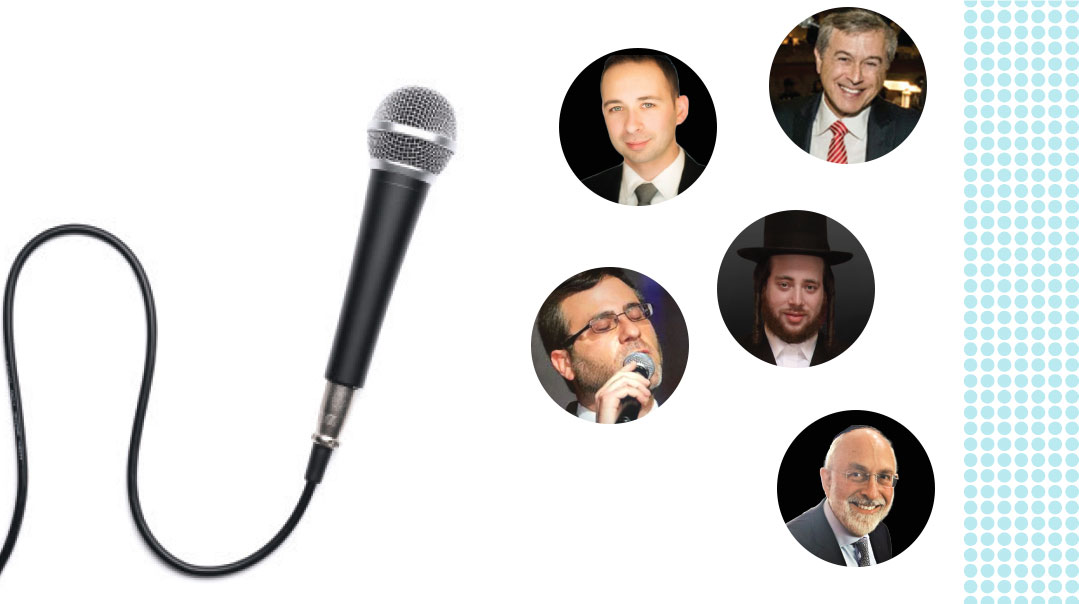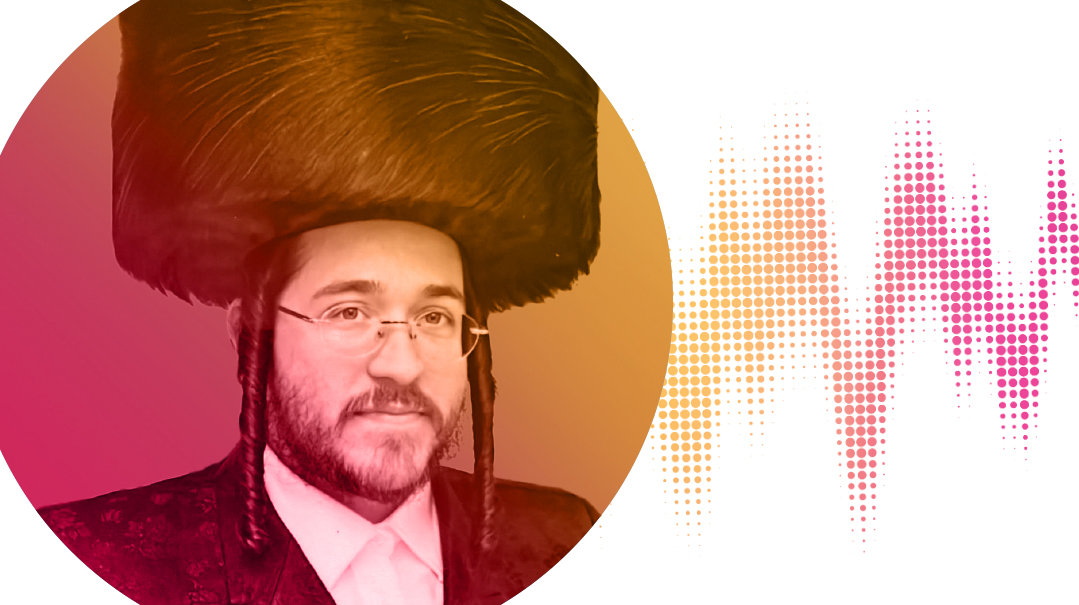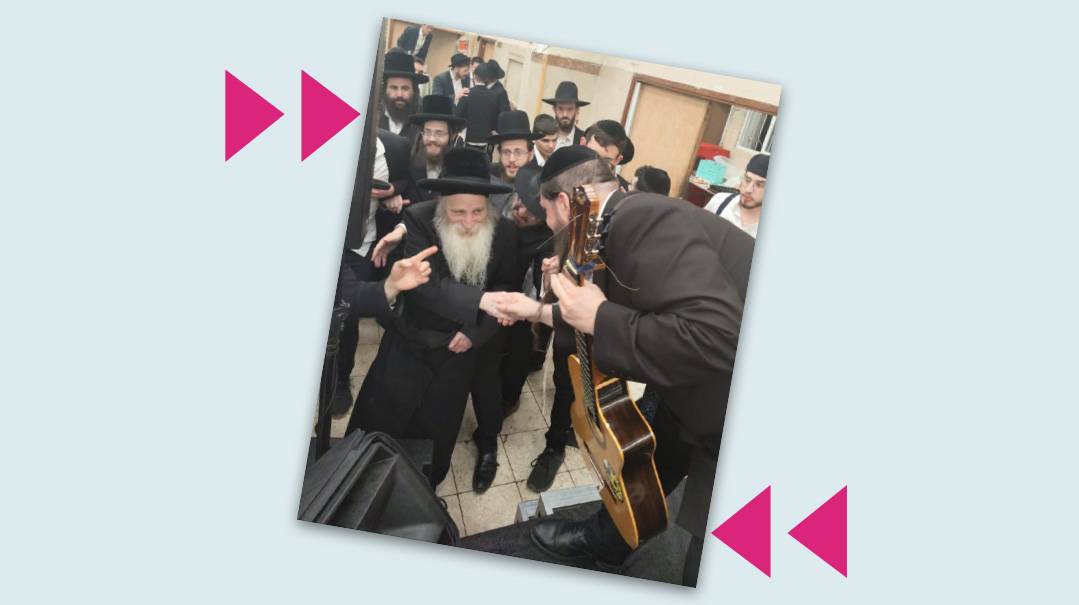Little Stars, Big Voices
| October 10, 2019Yesterday's child stars tune in to today's music

Yoeli Teichman
You know my voice from
I sang on the Camp Shalva albums, Yosef Moshe Kahana’s “Nodeh Lecha,” Isaac Honig’s “Adon Hakol,” and the Brachos V’Hodaos album in the Teichman Kinder Klangen series.
How it all began
My uncle, Shraga Gold of the Shira Choir, was a good friend of Reb Moshe Goldman, and he loved Reb Moshe Goldman’s tapes. I once sang at a family wedding to which Reb Moshe, being my uncle’s friend, was invited. He remembered my singing from that wedding and asked me to join the Camp Shalva choir.
The solos didn’t come right away. First I just sang as part of the group. When we recorded in the studio, Reb Moshe used to give a few boys turns to record the solos, and then later he decided which ones to use for the actual album. When the Somachti album came out, my solos were a surprise to me and totally unexpected.
My seasonal pick
“Oy yoy yoy, zachreinu l’chaim” is a song that’s stood the test of time. As soon as the shofar is blown, and throughout the Yamim Noraim period, you’ll hear people singing it. Although it’s serious, it’s so warm and uplifting, it’s not a depressing song. Personally, it pierces my heart.
Still singing?
I daven from the amud occasionally.
Back then…
There were less albums. When a new tape came out, it would keep playing the whole summer. People sat down to hear it and enjoy, and they learned every kneitsch of the songs.
How my stint as a child soloist affected my life
I think the main thing it taught me was “gam zeh ya’avor — this too shall pass.” You can’t fight nature — at some point your voice is going to change, and you’ll no longer be a child star. I was a soloist for three years, and then it was over. Times come and go by so fast, and you have to chap arein — make the most of each stage while you’re there. The lesson extends past the choir: Life is transient; my kids too will grow up fast, and my time with them is limited. On the other hand, the repercussions of our actions can last for a long time — the songs that I sang are still playing.
Echoes
I didn’t take any voice lessons, and I wasn’t looking to become a soloist — it just happened. But what we boys in the choir had viewed as just a “nice experience” was very far-reaching. “Pnei L’elbon,” a composition that came straight from Reb Moshe’s heart while he davened on Kol Nidrei night — he cried when he told me how the tune came to him as he focused on those words — is still being sung 20 years later.
Reverberations
One of my solos was a moving Yiddish song that Reb Moshe Goldman wrote. It was called “The Neshama Song,” and it tells a powerful story and lesson about the lofty mission of the soul of a child born with special needs. After it was released, I remember people coming over saying that they had sick children and the song had given them great chizuk. It touched people very deeply.
Years later, a family member of mine was approached at a simchah by someone dressed in chassidish clothing. “Look over here,” he said, bending in and showing him that his ear had four piercings. “There was a while when I’d been off the derech. I was living in Israel then, and one day I wandered into Galpaz, the music store. There was this song playing — a child was singing with incredible purity, begging Hashem to ignore his sins and heed his voice. I was mesmerized and just had to buy the CD.”
Ultimately, that song — it was “Pnei L’elbon” — with its plea for Hashem to turn to us in our low state, hear our tearful voices, and forgive us, was what sparked his return.
Sweet memories
I never missed cheder to sing. So we used to schedule recording sessions on the long Friday afternoons during the summer, or on Motzaei Shabbos in the winter. Moshe would come from Boro Park to Williamsburg to pick me up and then took me home afterward. He was a very warm person. We became close, and years later, I visited him in the hospital when he wasn’t well. It was a very emotional experience and it was the last time we spent quality time together.
My favorite solo
The one that became most famous was probably “Koli Shema,” from Reb Moshe Goldman’s song “Pnei L’elbon,” on the Camp Shalva Somachti album.
The choir scene then and now
These days, the choirs have gotten so much more professional and technologically advanced. But Moshe Goldman’s songs had a certain chein, and people still like to hear them today. Our world was more innocent then, and his compositions brought out the purity of the children’s voices. The simplicity was part of the appeal.
Advice to child stars
Think about the words you’re singing. Not about how you sound, or where to “kvetch,” but just about the words. There’s a difference between performing well and really putting yourself into the words you’re singing. I once recorded a solo with Reb Moshe and he said to me, “Yoeli, I can hear that you weren’t thinking of the words’ meaning.” He sat down and explained the significance of the words to me, I focused, we recorded it again — and we were both able to hear the difference.
Yossie Sonnenblick
You know my voice from
I was a soloist on the 1960s Pirchei albums, as well as alongside Chazzan Moshe Koussevitzky, and on Modzitzer Favorites Volume II with Reb Bentzion Shenker.
My favorite solos
My very first recording still has a special place for me — that was the solo “Kevakoras” in the song “U’bashofar Gadol” on the Modzhitz album. It’s not that widely known. Then there are my solos on the Pirchei albums: the classic “Racheim B’chasdecha” is a favorite, as is Rabbi Baruch Chait’s “Mi Ha’ish.” And of course, “Eilecha.” Of the pieces I sang with Chazzan Koussevitzky, “Mi She’asah Nissim” is my favorite. It’s a beautiful, multifaceted piece, a chazzanus recital.
Echoes
Here and there I hear these vintage songs playing at weddings, kumzitzes, or used by a baal tefillah in davening. I think that they have a lot of purity and feeling and definitely do what good niggunim are supposed to do.
How my stint as a child soloist affected my life
There has to be some effect. I guess I did become a public figure to some degree in our circles, although I tried not to let the celebrity status affect my life much. On the other hand, the opportunities to sing with Chazzan Koussevitzky gave me an appreciation for chazzanus. I still love chazzanus today, because of my early introduction to it.
Most notably, perhaps, that early push to perform removed my fear of singing in public. When I sang as a young child along with Koussevitzky in Beth El in Brooklyn, I was filled with trepidation. The choir, and the crowd, seemed absolutely huge. But once I had done that, I was able to sing and daven without fear. Those early experiences also gave me the opportunity to continue to sing and perform in my adult life, most notably with Dveykus and Journeys.
Still singing?
I have served as a baal tefillah on Rosh Hashanah for many years — and I still sing Pirchei niggunim like “V’hayah Bayom Hahu,” an old favorite.
The choir scene then and now
I don’t follow it closely, but when I do, it seems that the choirs have gotten both more frivolous and more commercial. Back in my time, it was a more serious endeavor — we wanted to make sure the voices sounded good. We definitely were not dancing, throwing the mics around, or performing on videos.
Yitzy Spinner
You know my voice from
I sang in the Miami Boys Choir for many years and was a soloist in many recordings and concerts.
The choir scene then and now
I left the choir in 1995. Twenty-five years later, we are in a very different world. Back when we performed, the audience had to come to the concert to see and connect to our music. Today, concert videos are on YouTube, instantly in everyone’s pocket. That constant live broadcasting creates a lot of pressure for the kids performing. Choir performances have also become a more complex science, moving way beyond the basic dance moves that we used, in line with today’s more sophisticated production levels. And there’s no margin for error, no room for any mistakes. On the flip side, with today’s technology, you can manipulate everything electronically. Back then we had to sing everything over and over again in the studio until it was perfect.
Sweet memories
It was all a great experience, especially the travel and touring. Yerachmiel always scheduled our more far-flung concerts during the summer or winter break so they didn’t interfere with yeshivah, and he always included tours of the city in our schedule. I do remember some mishaps, though. There was a time when we were travelling through Amsterdam and my group somehow got lost — a few dozen kids, led by a chaperone, in a foreign city, in pre-cell-phone days. I remember it as a fun kind of fiasco, really memorable, and I guess we somehow got ourselves back.
My favorite solo
For a lot of Miami fans, my name is synonymous with “Sunshine” — a big solo of mine — but really, the first solo I sang is the one that remains special to me. It was at a concert in Montreal, the high part of a song called “Basru.” The other memorable solos are the times I joined my father onstage — he played clarinet and saxophone, and I sang. We did that a few times.
How my stint as a child soloist affected my life
It opened a door for me. I’m an orchestrator and full-time chazzan today, and being a choir soloist is what gave me the confidence to sing in front of a large crowd, as well as the initiation into the world of music. I think that the choir experience, especially the traveling, has also affected my parenting. I try to help my own children have positive life experiences that can broaden them and build them up.
Something else that happened is that I became a familiar face to a lot of people, because I appeared in the annual filmed concerts, the Miami Experiences. With today’s technology, Jewish performers get a lot of exposure. But back then there were lots of families who had no other videos in the house, and all that they allowed the kids to watch was the Miami Experience. So for them, I got frozen in time as a nine-year-old soloist. I once had someone come up to me and say, “Didn’t you used to be Yitzy Spinner?”
Advice to child stars
Enjoy every minute. Music should be fun, performed with enjoyment and passion.
David (Doody) Rosenberg
You know my voice from
I was a soloist in Yigal Calek’s choir, the London School of Jewish Song.
My favorite solos
That’s got to be “Shimu Melachim” from Yigal’s first record. The words are uncommon — they’re taken from Shiras Devorah, and their meaning is so beautiful. “Anochi laHashem, anochi ashirah” — as I sang, I felt that this was an avenue for self-expression in song.
Another one would have to be “Al Zeh Hayah,” from the same record. The words are from Eichah, and the song is both melodious and melancholy. I could find myself within the song.
Still playing?
There are some songs from those years that still move me — like “Mah Navu,” which is an amazing composition, with many different moods and movements. At some point I started sharing my own compositions with Yigal, and in honor of the choir’s tenth anniversary, he released an album entirely of my own compositions. Of those, “Hamalach” and “Veyitein Lecha” still have a special place for me.
Still singing?
I’m an occasional baal tefillah, and I sometimes sing with my children for a charitable cause or for a sick person, but I don’t sing professionally. My son Hershele (with whom I recorded an album) sings and plays professionally.
Sweet memories
The fun we had in that studio! We recorded in a huge studio on Tottenham Court Road. It was famous at the time — the Beatles had recorded a song there, I believe. Our rehearsals were great fun, and they cemented many friendships, so that 50 years later I still have good friends going back to my choir days. In fact, at my bar mitzvah, the choir surprised me — they all showed up and sang. They called me up to sing solo too. I remember that they presented me with a silver becher, and “read” the inscription engraved on it, but as I viewed it from my seat I could see that the becher was smooth — it hadn’t actually been engraved yet.
How my stint as a child soloist affected my life
Singing in the choir developed my musical awareness, leading to song-writing and composition. Now, as a father, I find that music has played a central role in cementing family values and celebrating Yom Tov.
The choir scene then and now
Today’s choir industry seems to be primarily about sales. Once upon a time, kids behaved like kids, and sang with the innocence and purity of childhood. The choreography was enacted in a really meaningful way. Today I find it is more superficial and commercialized.
Advice to child stars
Be yourself, natural, and don’t try to copy someone else or sing like an adult. Just sing like a child, with all your natural voice and all your heart. Always remember Who gifted you the voice!
Mendy Wald
You know my voice from
I sang in the Tzlil V’zemer Choir from 1982 to 1984.
Still singing?
I put out five solo albums as an adult, starting with Sameach, in 1996.
My favorite solos
Probably my best-known solo was “Eibeshter,” which I sang on Tzlil V’zemer Volume II as well as live in Brooklyn College. Then there’s “The Little Bird Is Calling,” which I sang on Volume I together with Shloime Dachs. That was a very popular English song.
Still playing?
Every once in a while you hear these oldies on Jewish Music Stream. Just yesterday at a bris someone came over to me to discuss “Eibeshter.”
The choir scene then and now
Choirs are so much more professional now. It’s a new generation, and styles have changed. A much wider audience watches the performances online. Choirs today have an advantage of newer, updated technology. The level of expertise in the performing arts and in sound and lighting arrangements has gone up, but as for the songs themselves, I don’t know.
Sweet memories
I was one of those rare kids who managed to sing for more than one choir. It happened like this. One Shabbos, after davening in Pirchei in Boro Park, I saw Yerachmiel Begun come in to speak to Rabbi Eli Teitelbaum a”h, who davened there too. Yerachmiel had a problem, because his Miami Boys Choir was scheduled to perform in Brooklyn College that Sunday night, and the voice of one of the soloists, Jonathan Paley, had suddenly changed. Jonathan was the soloist for what became one of Miami’s all-time hit songs — “Besiyata Dishmaya,” and without him they were really stuck. They noticed me and called me over, asking if I would like to sing at the concert. So I learned the song and performed a solo as a guest artist with the Miami Boys Choir the next evening. I forgot some of the words, but otherwise it was a last-minute solution that worked out perfectly — b’siyata d’Shmaya.
How my stint as a child soloist affected my life
It definitely made me feel good as a kid. It’s a big brachah for a child to have a talent that gives him such a boost in confidence.
Echoes
One of the most memorable personalities from my Tzlil V’zemer days was Mona Rosenblum. As musical director of the choir, he did all our arrangements and was a big part of the success of the choir. He had the highest level of musical expertise available in those days, and it was an amazing opportunity for us to work with a musical genius.
Advice to child stars
Be very careful with your voice, especially when it’s transitioning into adulthood. Don’t yell and scream in camp, or risk becoming hoarse, because this can affect your singing. That was something I was particular about, and it helped my voice transition smoothly, baruch Hashem. More importantly, you should feel lucky and privileged to be able to entertain and inspire Yidden. Be humble and realize that the songs you are singing can affect other people’s souls.
(Originally featured in Mishpacha, Issue 781)
Oops! We could not locate your form.












